08/22/18
K-State Current - August 22, 2018
K-State Current is a weekly news update for the Kansas Board of Regents to apprise the Regents on a few of the many successes and achievements made by K-State faculty, staff and students.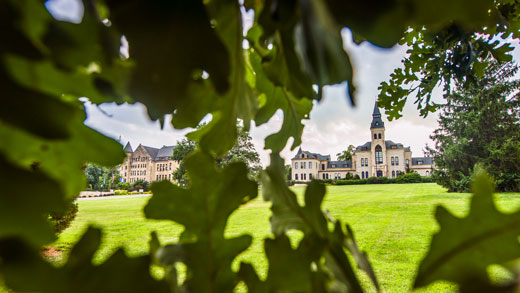
K-State News
Money's on K-State: University again tops magazine's annual ranking of best college values in state
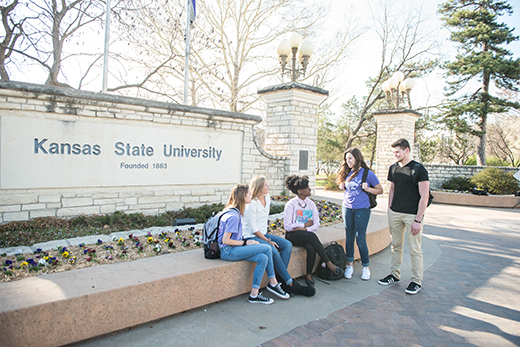
For the third year in a row, Money magazine is recognizing Kansas State University as the top university value in Kansas. The ranking is the second in recent months that highlights the university's position as the best educational investment in the state.
Quality of education, affordability and various student outcome factors are used to determine the magazine's best colleges, with Kansas State University taking the top spot among the schools in Kansas that met Money's ranking criteria. Among the areas where the university leads in Kansas is the average starting salary of new graduates. The $50,000 average for a new alumnus of K-State is $500 higher than that for new graduates of the second-place school on the magazine's state list, the University of Kansas.
In May, SmartAsset, a financial services company, rated Kansas State University as the state's best education value for the fourth year in a row.
"As the new provost of Kansas State University, these strong national rankings show me that this university's academic programs are among its many strengths," said Charles Taber. "When our new graduates are commanding the highest average starting salary in the state, it shows they are in demand and are graduating with the education and skills that employers seek. I look forward to doing all I can to help K-State continue as the best educational value in the state and to help further build its brand as a national educational value."
The No. 1 choice of Kansas high school graduates, Kansas State University's most recent postgraduation survey shows a 95-percent placement rate in students securing a job or continuing their education. The university, which offers more than 250 majors and options, makes affordability a priority, awarding more than $248 million in student aid last year, including more than $38 million in scholarships.
Award-winning faculty and key student services, such as K-State First, the university's first-year student success program, and the Career Center, which last year brought more than 800 employers to campus to interview students about jobs and internships, are just a few of the ways K-State helps students stay on track to degree completion and be career ready once they graduate.
K-State also ranks highly with its students, according to the latest survey by The Princeton Review, which rates K-State No. 4 for best quality of life, No. 6 for best athletic facilities, No. 7 for best health services and No. 8 for happiest students. Students also love the university's home, in Manhattan, rating K-State No. 3 in the nation for great town-gown relations.
Sen. Jerry Moran to present Landon Lecture at Kansas State University
U.S. Sen. Jerry Moran, Kansas, will deliver the first Landon Lecture of the 2018-2019 school year at Kansas State University. Moran's lecture, "Answering the call: Serving a global society post 9/11," will be 10:30 a.m. Tuesday, Sept. 11, in Forum Hall at the K-State Student Union, and is open to students, faculty, staff and the public.
Sept. 11, 2018, marks the 17th anniversary of the day terrorists launched the largest attack on U.S. soil since Pearl Harbor. It's a day not to be forgotten and a day that has changed the world in many ways, from international relations and world trade to security and defense. In this Landon Lecture, Sen. Moran will reflect on how these attacks invigorated his call to service and helped inform his ongoing priorities in Washington, D.C., on behalf of our global society.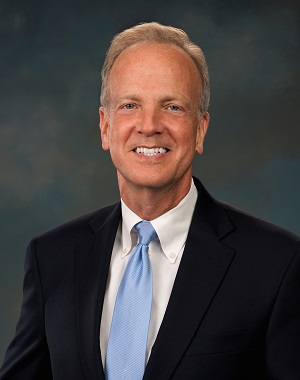
"Landon Lectures are an incredible opportunity for the K-State community to hear firsthand from today's national and international leaders," said Linda Cook, chair of the Landon Lecture Series and the university's chief of staff and director of community relations. "That's why we're especially pleased to kick off this year's lecture series with Sen. Moran, who has been representing Kansas in the U.S. Congress since 1996, first as a member of the House and now as a member of the Senate."
A senator since 2011, Moran is a member of the Appropriations, Commerce, Veterans' Affairs, Banking and Indian Affairs committees. He is co-founder and a member of the Senate Hunger Caucus, Senate Community Pharmacy Caucus and the Senate Economic Mobility Caucus. He serves as co-chair of the Congressional Task Force on Down Syndrome, Senate Aerospace Caucus, the Senate NIH Caucus and the Senate Defense Communities Caucus.
Before his election to the Senate, Moran served seven terms in the U.S. House of Representatives. He has been returning to Kansas each weekend since he was first elected to Congress in 1996, and holds town hall meetings in all 105 Kansas counties during every session as part of his "Kansas Listening Tour."
Moran's service has earned several prestigious honors, including the Science Coalition's Champion of Science Award and the National Rural Health Association's Legislative Award in 2014, the National Down Syndrome Society's Impact Award in 2017 and the inaugural Dennis Moore Alzheimer Champion Award from the Alzheimer's Association of Central and Western Kansas in 2018.
Originally from Plainville, Moran attended Fort Hays State University and then the University of Kansas, completing a degree in economics. After an early career as a banker, he received his law degree from the University of Kansas School of Law where he graduated Order of the Coif.
A member of the board of governors of the KU School of Law, the board of trustees of the Fort Hays State University Endowment Foundation and a former trustee of the Eisenhower Foundation, Moran is an active member of the Lions Club, Rotary Club and the Sons of The American Legion. He also serves on the U.S. Military Academy's board of visitors and previously served on the U.S. Air Force Academy's board of visitors.
Moran and his wife, Robba, live in Manhattan and have two daughters — Kelsey and Alex — who both hold degrees from Kansas State University.
The Alfred M. Landon Lecture Series is one of the most prestigious lecture series in U.S. colleges and universities. Instituted in 1966 by former Kansas State University President James A. McCain, the series is a tribute to the late Alfred M. Landon, who served as governor of Kansas from 1933-1937. On Dec. 13, 1966, Gov. Landon delivered the series' first lecture, "New Challenges in International Relations." Sept. 9, 2018, would have marked Gov. Landon's 131st birthday.
A new dual degree program designed by Kansas State University will allow students to concurrently earn both their Bachelor of Science in computer science and Master of Business Administration degrees.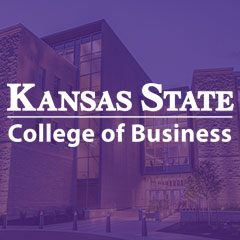
The computer science/MBA dual degree program will allow students to combine technical IT skills with advanced business knowledge to drive leadership and decision-making in the modern technological business environment.
"Over the past decade, computer science has become integral to almost all types of businesses, and the core business of many new tech companies," said Scott DeLoach, department head of computer science. "Our students understand this and have been looking for opportunities for more business education. This program will make gaining that education much easier. I believe this partnership between the department of computer science and the College of Business has a lot of strategic value, and we are making plans for even more combined programs in the near future."
According to the industry leaders that make up both department's advisory councils, the advanced business technology skills acquired in this program will provide graduates with broad marketability and opportunities for career flexibility. Emphasis is given to blending classroom theory with applied projects, like internships or MBA capstone projects, to provide an unparalleled educational experience.
The joint degree program requires 147 credit hours — 120 hours for the bachelor of science in computer science, plus 27 hours in MBA coursework. Students could receive two degrees in five to five-and-half years. Undergraduate students would begin to take business courses in their senior year, taking an additional two to three more semesters to complete the MBA program.
"This is clearly a win-win academic partnership between the department of computer science and the College of Business Administration," said Chwen Sheu, associate dean for academic programs. "Including computer science students with a sound technical background in the MBA program will definitely improve the quality of the program, and the student will greatly benefit from the application-oriented business curriculum. We are excited about this new partnership and believe it will attract high-quality students to both programs."
K-State Faculty Highlights
Four College of Business faculty members featured in Sustainability academic journal
College of Business Administration associate dean for academic programs Chwen Sheu was recently invited to guest edit a special issue for the academic journal Sustainability, titled "Toward Sustainability: Supply Chain Collaboration and Governance."
This special issue aims to contribute to the sustainability and corporate social responsibility literature by answering the research question, "What can firms do, and how, to improve environmental and social performance within their supply chains?" It invited manuscripts that investigate the development, management, and governance of inter-organizational collaborative programs aimed at achieving the goals of sustainability.
The special issue closed on July 10. Four College of Business Administration faculty members — Bongsug Chae, MK Kim, Jiho Yoon and Sheu — and a doctoral student in hospitality administration — Eunhye Park — submitted the following four manuscripts, which were accepted and published:
- Corporate Social Responsibility (CSR): A Survey of Topics and Trends Using Twitter Data and Topic Modeling, by Bongsug (Kevin) Chae and Eunhye (Olivia) Park.
- Environmental Sustainability as a Source of Product Innovation: The Role of Governance Mechanisms in Manufacturing Firms, by Myung Kyo Kim, Chwen Sheu and Jiho Yoon .
- Toward Supply Chain Sustainability: Governance and Implementation of Joint Sustainability Development, by Yongmei Xu, Jiho Yoon, Myung Kyo Kim and Chwen Sheu.
- A Dynamic Failure Rate Forecasting Model for Service Parts Inventory, by Ta-Yu Chen, Woo-Tsong Lin and Chwen Sheu.
Corporate social responsibility and sustainability is one of the strategic themes for the College of Business, and these four faculty members' efforts in this area support the college's strategic plan.
Sustainability is an international, cross-disciplinary, scholarly, and open access journal of environmental, cultural, economic, and social sustainability of human beings. It provides an advanced forum for studies related to sustainability and sustainable development, and is published monthly online.
Wheat code finally cracked; wheat genome sequence will bring stronger wheat varieties to farmers
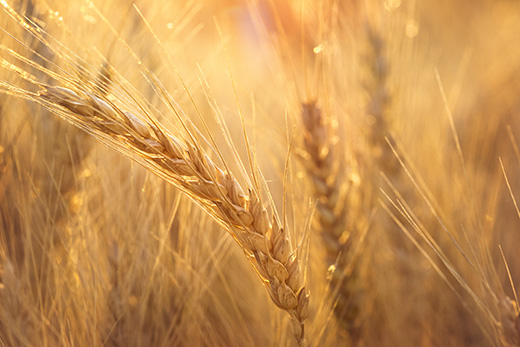 Kansas State University scientists, in collaboration with the International Wheat Genome Sequencing Consortium, published today in the international journal Science a detailed description of the complete genome of bread wheat, the world's most widely cultivated crop.
Kansas State University scientists, in collaboration with the International Wheat Genome Sequencing Consortium, published today in the international journal Science a detailed description of the complete genome of bread wheat, the world's most widely cultivated crop.
This work will pave the way for the production of wheat varieties better adapted to climate challenges, with higher yields, enhanced nutritional quality and improved sustainability. The article is titled "Shifting the limits in wheat research and breeding using a fully annotated reference genome."
The research article — authored by more than 200 scientists from 73 research institutions in 20 countries — presents the reference genome of the bread wheat variety Chinese Spring. The DNA sequenceordered along the 21 wheat chromosomes is the highest-quality genome sequence produced to date for wheat. It is the result of 13 years of collaborative international research and the support of the National Science Foundation, the U.S. Department of Agriculture's National Institute of Food and Agriculture, Kansas farmers and many others.
"It is a dream come true for Kansas wheat farmers, who were the first to invest in the wheat genome sequencing project and were pivotal in rallying U.S. wheat farmers in support of the wheat genome sequencing project," said Bikram Gill, distinguished professor emeritus of plant pathology at Kansas State University who organized the first National Science Foundation and U.S. Department of Agriculture-sponsored workshop planning meeting on wheat genome sequencing in Washington, D.C., in 2003.
A key crop for food security, wheat is the staple food of more than a third of the global human population and accounts for almost 20 percent of the total calories and protein consumed by humans worldwide, more than any other single food source. It also serves as an important source of vitamins and minerals.
Kansas farmers grow an average of 340 million bushels of wheat each year, but acres planted to wheat have dropped dramatically over the past decade, from 10 million acres to fewer than 8 million. To meet future demands of a projected world population of 9.6 billion by 2050, wheat productivity needs to increase by 1.6 percent each year. To preserve biodiversity, water and nutrient resources, the majority of this increase has to be achieved via crop and trait improvement on land currently cultivated, rather than committing new land to cultivation. In order for farmers to dedicate these precious resources to wheat production rather than production of other crops, wheat farming must become profitable.
With the reference genome sequence now completed, breeders have at their fingertips new tools to address global challenges. They will be able to more rapidly identify genes and regulatory elements underlying complex agronomic traits such as yield, grain quality, resistance to fungal diseases and tolerance to physical stress — and produce hardier wheat varieties.
"Completion of the sequence is a landmark event that will serve as a critical foundation for future wheat improvement," said Allan Fritz, Kansas State University professor of agronomy and wheat breeder. "It is the key to allowing efficient, real-time integration of relevant genetics, making the selection process more efficient — it's a turbocharger for wheat breeding."
It is expected that the availability of a high-quality reference genome sequence will boost wheat improvement over the next decades, with benefits similar to those observed with maize and rice after their reference sequences were produced.
"Kansas wheat farmers have been supporting the wheat genome sequencing efforts through the Kansas Wheat Commission's wheat assessment since the establishment of the International Wheat Genome Sequencing Consortium in 2005, with a cumulative amount of nearly a quarter of a million dollars," said Justin Gilpin, chief executive officer for Kansas Wheat. "The sequence of the bread wheat genome has already had a positive effect on wheat improvement, which not only affects the science behind wheat breeding, but has a long-lasting positive outcome in regard to wheat producer productivity, profitability and, ultimately, livelihoods."
Sequencing the bread wheat genome was long considered an impossible task because of its enormous size — five times larger than the human genome — and complexity — bread wheat has three sub-genomes and more than 85 percent of the genome is composed of repeated elements.
"It is exciting to be a part of this landmark achievement," said Jesse Poland, associate professor at Kansas State University and director of the Wheat Genetics Resource Center and the U.S. Agency for International Development Innovation Lab for Applied Wheat Genomics. "This international effort, toward something that was once deemed impossible, will have tremendous impact on wheat in Kansas, and the world."
The impact of the wheat reference sequence has already been significant in the scientific community, as exemplified by the publication on the same date of six additional publications describing and using the reference sequence resource, one appearing in the same issue of Science, one in Science Advances and four in Genome Biology. In addition, more than 100 publications crediting the reference sequence have been published since the resource was made available to the scientific community in January 2017.
"We are extensively using the new reference sequence for more informed molecular breeding," Poland said. "It is really having a big impact."
In addition to the sequence of the 21 chromosomes, the Science article also presents the precise location of 107,891 genes and of more than 4 million molecular markers, as well as sequence information between the genes and markers containing the regulatory elements influencing the expression of genes.
The International Wheat Genome Sequencing Consortium achieved this result by combining the resources it generated over the last 13 years using classic physical mapping methods and the most recent DNA sequencing technologies; the sequence data were assembled and ordered along the 21 chromosomes using highly efficient algorithms, and genes were identified with dedicated software programs.
All consortium reference sequence resources are publicly available at its data repository at URGI-INRA Versailles and at other international scientific databases such as GrainGenes and Ensembl Plants.
The International Wheat Genome Sequencing Consortium, with 2,400 members in 68 countries, is an international, collaborative consortium, established in 2005 by a group of wheat growers, plant scientists, and public and private breeders. The goal of the consortium is to make a high-quality genome sequence of bread wheat publicly available, in order to lay a foundation for basic research that will enable breeders to develop improved varieties.
K-State Student News
Engineering students take first place in HVAC design competition
A team from the architectural engineering and construction science department at Kansas State University has taken first place in the 2018 ASHRAE Student Design Competition and Setty Family Foundation Applied Engineering Challenge in the HVAC System Selection category.
The competitions recognize outstanding student design projects and encourage students to become involved in the design of energy-efficient HVAC systems. A total of 63 teams participated with 35 judged at the society level.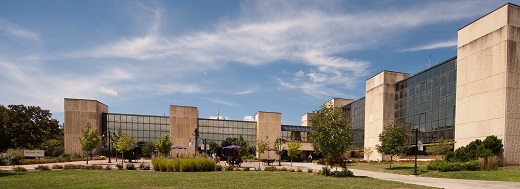
The Kansas State University team submitted its competition presentation and report digitally in May to the judging committee at the local level, which for the university is the Kansas City ASHRAE chapter. From there the entry went on to the region level, ASHRAE Region IX, for judging. First-place entries from each of the 15 regions were then sent to the international level of the society for judging in June at ASHRAE’s annual conference in Houston.
This year’s competition project focused on a new 70,000-square-foot, four-story, mixed-use complex north of Istanbul, Turkey, near the new international airport. The facility featured retail and office spaces, a restaurant and a hotel in support of the upcoming rapid growth in the area when the airport is completed in 2019.
The students selected water-to-air heat pumps, water-to-water heat pumps, active chilled beams and a hybrid ground loop/cooling tower. The system proposal allows for integration of sustainable solutions encompassing energy efficiency, human comfort and productivity, indoor environmental quality and architectural aesthetics.
Team members, all spring 2018 graduates in architectural engineering, were as follows: Whitney Luck, El Dorado; Andres Saldivar, Garden City; Madison Hopfinger, Overland Park; Kevin Clark, Solomon; and Evan Reese, St. Marys.
Faculty advisers were Julia Keen, professor, and Fred Hasler, associate professor, both from the department of architectural engineering and construction science.
The projects will be shared and awards presented at the 2019 ASHRAE Winter Conference, Jan. 12-16, in Atlanta.
ASHRAE, founded in 1894, is a global society advancing human well-being through sustainable technology for the built environment. The society and its more than 56,000 members worldwide focus on building systems, energy efficiency, indoor air quality, refrigeration and sustainability.